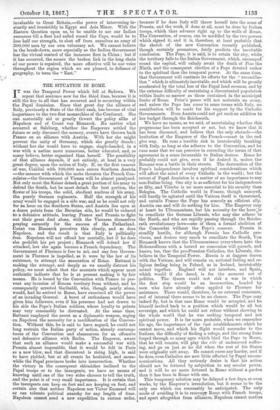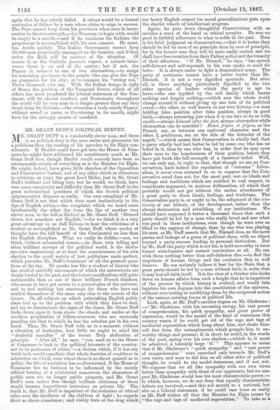THE SITUATION IN ROME.
IT was the Temporal Power which fell at Sadowa. We repeat that sentence now for the third time, because it is still the key to all that has occurred and is occurring within the Papal dominion. Since that great day the alliance of Italy, previously a State of the third rank, has become of vital importance to the two first monarchies of the Continent. She can materially aid or greatly thwart the policy alike of Napoleon and of Count von Bismarck. No matter what occurred at Salzburg, whether the Emperors settled the future or only discussed the scenery, events have thrown back France on an alliance with Austria. With her she might prevent the unity of Germany, which she greatly dreads ; without her she would have to engage, single-handed, in a war with a nation more numerous, better educated, and, as many believe, better organized than herself. The possibility of that alliance depends, if not entirely, at least in a very ,great degree, upon the action of Italy. If, on the first rumour -of war, Gialdini with 100,000 men enters Southern Austria —the menace with which the mobs threaten the French Con- sulates—the Government of Vienna will be almost paralyzed. Not only must the Kaiser detach a great portion of his army to defend the South, but he must detach the best portion, the flower of his troops, the solid, obedient nucleus of his army, the purely German regiments. Half the strength of his army would be engaged in a side war, and as he could not rely for an hour on the Southern States, and Austria lies open at .a dozen points from the Bavarian side, he would be reduced to a defensive attitude, leaving France and Prussia to fight out their great duel alone, with the Viennese themselves praying earnestly for the success of the Fatherland. Omit von Bismarck perceives this clearly, and so does Napoleon, and the result is that Italy is politically iree. Napoleon will not offend her mortally, lest if he does she prohibit his pet project ; Bismarck will defend her if attacked, lest she again become a French dependency. The Government of Florence is free to act, and any free Govern- ment in Florence is impelled, as it were by the law of its existence, to attempt the annexation of Rome. Rattazzi is making the attempt, and deeply as we usually distrust his policy, we must admit that the accounts which appear most authentic indicate that he is at present making it by fair means. He is bound by the Convention with France to pre- vent any invasion of Roman territory from without, and he consequently arrested Garibaldi, who, though nearly alone, would, had he arrived in Rome, have exercised all the power of an invading General. A burst of enthusiasm would have given him followers, even if his presence had not drawn to his side the Pope's Italian soldiers, whose loyalty to priests may very reasonably be distrusted. At the same time, Rattazzi employed the arrest as a diplomatic weapon, urging on Napoleon the necessity for a modification of the Illonven- tion. Without this, he is said to have argued, he could not long restrain the Italian party of action, already contemp- tuous of the Convention and clamourous for an offensive and defensive alliance with Berlin. The Emperor, aware that such an alliance would make a successful war with Prussia almost impossible, that it would be felt in Paris as a new blew, and that discOntent is rising high, is said to have yielded, but at all events he hesitated, and mean- while the Papal provinces broke into insurrection. Whether the victory in the consequent skirmishes inclined to the Papal troops or to the insurgents, we have no means of knowing until one of the two sides chooses to tell the truth, .and the point is of very small importance. It is certain that the insurgents can keep on foot and are keeping on foot, and certain also that neither Napoleon nor Victor Emanuel will or can tolerate political anarchy for any length of time. Napoleon cannot send a new expedition to restore order, because if he does Italy will throw herself into the arms of Prussia, and the work, if done at all, must be done by Italian troops, which thus advance right up to the walls of Rome. The Convention, of course, can be modified by the two powers which signed it, and it is, therefore, at least probable that the sketch of the new Convention recently published, though certainly premature, fairly predicts the inevitable conclusion. The Pope, it is said, is to retain the city, while,. the territory falls to the Italian Government, which, encamped round the capital, will calmly await the death of Pius the Ninth, and the consequent election of a Pope devoted rather to the spiritual than the temporal power. At the same time, that Government will continue its efforts for the " reconcilia- tion " which is ultimately inevitable, and which will be greatly accelerated by the total loss of the Papal land revenue, and by the extreme difficulty of restraining a discontented population within limits so narrow as those contained in the municipal limits of Rome. Peter's pence will not maintain an army, and unless the Pope has come to some terms with Italy, no contribution will be made for his support by the Catholic Governments. Even Austria could not get such an addition to her budget through the Reichsrath.
We have no means, as we said, of ascertaining whether this programme has been accepted or not, but we know that it has been discussed,- and believe that the only obstacle—the hesitation of the Emperor of the French—must in the end give way. He runs a terrible risk in irretrievably breaking with Italy, so long as she adheres to the Convention, and he runs none that we can perceive in extending the terms of that agreement in a sense favourable to Italian desires. Rome he probably could not give, even if he desired it, unless the Romans won a battle in their streets. The destruction of the Pope's independence involves spiritual considerations which will affect the mind of every Catholic in the world ; but the extent of Papal dominion is a matter of no importance to any non-Italian being. One city is as sufficient for his independence as fifty, and Viterbo is no more essential to his security than Bologna. The Catholic world in France, though annoyed, will hardly be agitated until the Vatican itself is threatened, and outside France the Pope has scarcely an efficient ally. Austria can and will do nothing for him. The Emperor may at heart be Ultramontane, but his necessity for the hour:is to conciliate the German Liberals, who may chid adhere to the North, and who are rapidly passing through the Reichs- rath revolutionary laws—one of them a formal abolition of the Concordat without the Pope's consent. Prussia is steadily hostile, for although Prussia has Catholic pro- vinces, and desires very much to conciliate the South, Von Bismarck knows that the Ultramontanes everywhere hate the Hohenzollerns with a hatred no concession will quench, and knows, too, that the pro-Prussian Catholics, the Liberals, dis- believe in the Temporal Power. Russia is at daggers drawn with the Vatican, and will remain so, national feeling and re- ligious feeling being in Poland, as in Ireland, inextricably mixed together. England will not interfere, and Spain, which would if she dared, is for the moment out of politics. The Queen could not risk a war in which the first step would be an insurrection, headed by men who have already often applied to Florence for assistance. There would, therefore, be no external resistance, and of internal there seems to be no chance. The Pope may indeed fly, but in that case Rome would be occupied, and he himself invited back to a position which would be all but sovereign, and which he could not refuse without showing to the whole world that he was seeking temporal and not spiritual power. It is far more probable, when we remember his age, the importance of the vast establishments which he cannot move, and which his flight would surrender to the Italians the difficulty of finding a refuge, and the strong links forged through so many ages which bind the Pope to Rome, that he will remain, will play the rede of undeserved suffer- ing, and go on just as he did when the rest of his States were originally reft away. He cannot curse any harder, and if he does, oven Catholics are now little affected by Papal excom- munications. All they seriously desire is that his action. should not be fettered by subjection to any secular power, and it will be no more fettered in Rome without a garden. than it has been in Rome with one.
This temporary solution may be delayed a few days, or even weeks, by the Emperor's . irresolution, but it seems to be the only one which can reasonably be anticipated. The only mode of avoiding it is to reoccuyty Rome with French troops, and apart altogether from alliances, Napoleon cannot confess again that he has utterly failed. A return would be a formal confession of failure by a man whose claim to reign is success. The Pope cannot keep down his provinces when once in insur- rection by his own strength,—his Treasury, to begin with, would be empty in a month,—and if he summons the Italians, the programme is accomplished with his own consent. He must, too, decide quickly. The Italian Government cannot keep 60,000 men perpetually encamped on the frontier, and if they retire the Reds will be masters of the situation. Of course if, as the Catholic journals expect, a miracle inter- venes, there is an end of the matter ; but if not, the Papacy is reduced to one of two alternatives,—to resign its remaining provinces to the people, who can give the Pope no guarantee for his city ; or to summon his "erring son," Victor Emanuel, who can. With the Italian troops in sight of Rome, the problem of the Temporal Power, which of all others has most perplexed the Liberal statesmen of the Con- tinent, will be almost resolved, and Protestants throughout the world will be very near to a danger greater than any they dread from Dr. Colenso,—the attraction a truly saintly Papacy, without sword or purse, or threatening in its mouth, might have for the unhappy masses of mankind.































 Previous page
Previous page